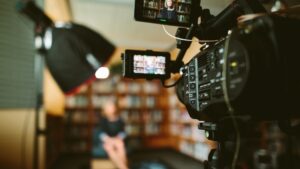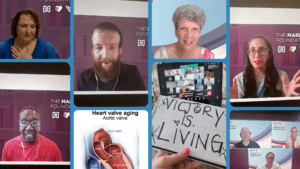
Rare Community Profiles is a Patient Worthy article series of long-form interviews featuring various stakeholders in the rare disease community, such as patients, their families, advocates, scientists, and more.
How Two Participants Found Connection and Support at the Marfan Foundation’s 2024 Global Virtual Conference
The Marfan Foundation serves as a vital resource for individuals living with Marfan syndrome and related conditions, such as Vascular Ehlers-Danlos syndrome (VEDS), Loeys-Dietz syndrome (LDS), and other connective tissue conditions. Through its comprehensive programs, educational materials, and resources, the Marfan Foundation reaches over one million people annually, providing education, support, and hope to individuals and families affected by these complex conditions.
The Marfan Foundation stands deeply committed to saving and improving lives. $0.81 out of every dollar raised directly funds programs, research, and community-building. The Foundation’s website, available in 25 languages, serves as a global information hub while the Help and Resource Center provides non-urgent medical advice by connecting community members to appropriate experts.
The human dimension resonates deeply with the Marfan Foundation. At its core, the Foundation centers around ensuring that every person with genetic aortic and vascular conditions has the care they deserve—and the community to uplift them. At the Foundation’s 2024 Global Virtual Conference, community members, care partners, and medical professionals from around the world came together to holistically discuss the impact of these conditions, self- and community care, symptom management, mental health, grief, family planning, and more. (Here is a more comprehensive look at this year’s schedule.)
This year, two new attendees joined the Global Virtual Conference for the first time: Marta, who has Loeys-Dietz syndrome, and Bonnfire, who says they are:
“Finally getting tested to figure out what flavor of connective tissue disorder I have.”
Both Marta and Bonnfire recently sat down with Patient Worthy to discuss more about their experiences at the Marfan Foundation’s Global Virtual Conference, the challenges of living with rare and chronic conditions, and why the Marfan Foundation offers hope.

Marta: Taking Charge of a Family Medical Complexity
For Marta, Loeys-Dietz syndrome—a rare condition affecting the body’s connective tissue—has long been part of her family’s history. But it was only through her pregnancy complications that the condition was identified. As Marta explains:
“During pregnancy, my aorta dilated 3 mm in just a short period of time. Doctors were concerned, so I had to give birth to my daughter at just 27 weeks old. It was a very long battle.”
One year after her daughter’s birth, Marta underwent surgery to replace her aorta. Confused by the sudden dilation, doctors recommended that Marta undergo genetic testing. Tests confirmed that she had Loeys-Dietz syndrome.
After her family was tested, doctors determined that Marta’s now 13-year-old daughter, brother, and father also have LDS: three generations in one family. But, looking back, Marta believes her grandfather may also have had LDS as he shared similar symptoms. Says Marta:
“Every day, we try to understand LDS more, especially as my family has faced complications. My daughter is facing puberty and starting to show symptoms of gastrointestinal problems and hyperflexibility. I deal with heart issues and vein dilations in my heart and brain. My father’s LDS mostly manifests in pulmonary and skeleton issues, my brother’s is mainly skeletal issues, and my sisters have neurologic and skeletal issues.”
But Marta found herself stumped after her daughter faced medical complications not easily solved by the local emergency department, an experience she shared in a pre-conference blog. Living in Lisbon, Portugal, Marta and her family do have access to care more so than other rural areas. Yet a wider lack of education and awareness often makes receiving adequate care difficult. She explains that the Marfan Foundation has played an essential role in allowing her to educate her doctors:
“After I found the Marfan Foundation, I joined every group I could and attended every meeting. I carry a briefcase with Foundation documents with me to appointments so doctors can read them and learn more about LDS, its symptoms, potential future complications, and how to manage them. To me, it’s important for doctors to read these before we’re seen so we can know if our symptoms are related to LDS or separate.
I don’t know anybody else outside of my family with LDS in Portugal. My doctors have followed us for a while and are trying to learn, because they haven’t seen anybody either. It’s been a learning path for everyone, but the Foundation’s information has been incredibly helpful. Without the Marfan Foundation, I would not know nearly as much as I do about LDS and caring for myself and my family.”
Bonnfire’s Journey to Find Answers–and Community
At 45 years old, Bonnfire has been on a frustrating 28-year mission to understand their health. Some nagging symptoms—hyperflexibility, autonomic dysfunction—first appeared at 17 years old, but never enough to fully interrupt Bonnfire’s life. For all intents and purposes, they had been pretty healthy. But health challenges reared their head again in 2019. Says Bonnfire:
“I was a fire walk instructor, I jumped out of a plane, and I wanted to hike mountains. In 2019, however, my symptoms got overwhelmingly bad and started impacting my ability to work. I started getting sick and repeatedly injured. I was chewing the crowns out of my head. By 2021, I started going down the connective tissue route. My biological father and uncle both died of aortic aneurysms, and my heart had been acting up. As I started facing dysautonomia symptoms, I realized my health issues were systemic. You don’t know until you know, and when you’re in this space of connective tissue, many times you don’t know until it sneaks up on you. For me, I’m now allergic to the sun, which adds a layer of complexity to my experience.”
Reflecting on their journey, Bonnfire views medical gaslighting and physician rejection as a central part. In 2022, they say, physicians believed them about their health issues. The initial medical pathway was working with a rheumatologist and sports medicine physician to learn whether Bonnfire had a variant of Ehlers-Danlos syndrome. Unfortunately, this experience of feeling dismissed and unheard is not uncommon for people living with rare or complex conditions. However, the Global Virtual Conference provided a stark contrast to these experiences. Says Bonnfire:
“To sit in a conference with well-respected physicians who offered support, told me to reach out, asked questions—that was a huge confidence shift for me. I walked into my pulmonologist appointment recently thinking I can ask more direct questions.”
Attending the Marfan Foundation’s Global Virtual Conference
The need for knowledge and support led both Marta and Bonnfire to the Global Virtual Conference, which took place from June 17-22, 2024. For Marta, the Conference offered a unique opportunity to gain medical insights from experts, alongside real-world lived experiences from others living with LDS. She explains:
“The medical research is very interesting, but I loved learning more about how other people with LDS live and manage symptoms. This is very important to me and helps us feel less alone.”
In terms of her family, Marta also views the Conference as invaluable for her daughter. She says:
“I’m the ‘Headmaster’ of our family and lead the charge with doctors and my daughter’s school when it comes to LDS. At the Conference, I learned more about the genetic angle of LDS. I also received documents and advice to give to the school so my daughter doesn’t have to participate in gym. Because she has aortic dilation, she must limit herself in exercise. The Foundation offers such great resources for me to handle all of our needs and make sure my family and I have a long, prosperous life.”
But most of all, Marta views the conference as informative and community-oriented. She left feeling empowered and understood:
“I feel like it is important to talk about the pain, but I also feel like it’s important to talk about the triumphs. I didn’t want to just learn medical terms, but the testimonies of people showing that even with these conditions and the associated difficulties, it is possible to thrive and live happily—sometimes with losses in the middle. But this is not the end. It’s not a death sentence. This is just an obstacle that we need to figure out how to get around. It’s about learning, and knowing that we’re not crazy. We’re not alone here. With every speech I heard and person I met, it hit me: if they can do it, I can do it. When I see people hear that their condition was managed or that their doctor stepped up, it shows me the light at the end of the tunnel. We’re talking the same language, feeling the same feelings. The Marfan Foundation’s Conference uplifted me and made me realize that I am capable of doing more.”
Finding Validation
For Bonnfire, the Conference offered validation and community support on a level they hadn’t experienced before. Thankfully, they say:
“I walked into the conference being undiagnosed and not knowing where I fit in, but I felt so incredibly welcomed and supported.”
One element of the Global Virtual Conference that resonated deeply with Bonnfire was the focus on mental health education and awareness. Having a rare disease can be challenging and isolating, placing a mental health burden on individuals—as if the stress of life itself isn’t enough! As a suicide activist who has dealt with suicidal ideation in their life, Bonnfire believes that the Conference’s openness and willingness to discuss the importance of well-being and mental health is a net positive for the community:
“I appreciated that, at the Conference, the Marfan Foundation focused on ways to make these conversations safe. We’re allowed to be scared or sad, and we need space for that to happen. Dr. Flynn [who led a general opening session] said it’s okay to step away and grieve the life you could have, or should have, lived.’”
The Conference gave Bonnfire valuable virtual face-to-face time with physicians and other community members. Bonnfire was astounded to learn that medical professionals who took part in Conference would speak with their local physicians, or that sessions on VEDS or AI Facial Recognition offered so many insights into diagnostics and managing emergent situations. They say:
“The Conference taught me so much, but I’ve also seen where we need to change the medical field to enhance understanding and respect. Moving forward, I would love to get involved in advocacy and spreading information to raise awareness. I’d especially like to focus on access to medical records and clarity over what medications and diagnoses are being added to our records. This work is vital for those of us who were in foster care. I want to find pathways for people in foster care or who were adopted who don’t have access to records. I had to read through my father’s death records just to get an ultrasound done on my aorta. Addressing that bias is important. And I want to make it clear to doctors—if someone comes in with a connective tissue condition and chest or peripheral pain, think more than pain control.”
People living with genetic aortic and vascular conditions have a 250 times greater risk of aortic dissection than the general population. A CT scan is needed for emergency diagnosis.
On the last day of the Conference, the Foundation threw a virtual dance party. When Bonnfire looked around the room and thought about victory—the word of the conference—the first thing that came to mind was:
“Victory is global.”
And as they look to the future, connected to community members around the world, that message has never been more present—or more clear.
Learn more about the Marfan Foundation.


